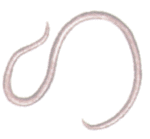Hookworms attach to the intestinal wall with hook-like mouthparts. They are hard to see because they are only about 3 mm long and very thin.
Dogs are infested with hookworms in one of three ways:
1. Hookworm larvae pass from the dam to the pups through the placenta before birth
2. Pups ingest larvae in the mother’s milk
3. Larvae penetrate the skin
 What problems do hookworms cause?
What problems do hookworms cause?
Hookworms suck blood from the tiny vessels in the intestinal wall and cause anaemia especially in puppies. Pale gums, lethargy and weakness are signs of anaemia.
Hookworm also cause bloody diarrhoea, weight loss and failure to grow.
Hookworm larvae burrow into the skin and cause itching and discomfort in a heavily infested environment such as kennels.
How do we diagnose hookworm infestation?
Hookworms produce a lot of eggs which are easily found in faeces under a microscope. Faecal examination is less reliable in very young puppies.
How is hookworm treated?
Most broad spectrum wormers, like Milbemax and Drontal, kill adult hookworms. We repeat the treatment 2-4 weeks later to kill the next wave of larvae maturing into adult worms.
Are canine hookworms infectious to people?
Adult hookworms do not infect humans. However, hookworm larvae can burrow into human skin and cause itching. They do not mature into adults. Wear shoes to avoid skin contact with hookworm infested soil especially in wet weather.
How do we prevent hookworm infection?
1. Deworm pups at six weeks of age
2. Deworm pets at high risk of reinfestation
3. Pick up and dispose of dog faeces, especially in yards, playgrounds, and public parks.
4. Do not allow children to play in potentially contaminated environments.
5. Treat nursing bitches concurrently with their pups.
6. Use broad spectrum worm treatments that are effective against hookworms.
